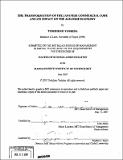The transformation of the Japanese commercial code and its impact on the Japanese economy
Author(s)
Yoshida, Toshihiro, M.B.A. Massachusetts Institute of Technology
DownloadFull printable version (7.052Mb)
Other Contributors
Sloan School of Management.
Advisor
John Akula.
Terms of use
Metadata
Show full item recordAbstract
The legal system is an essential basis of the society and economy of every country, and it changes continually in accordance with national social and economic situations. The Japanese Commercial Code is no exception. One of the most significant and fundamental Japanese laws, it was enacted in 1899 as part of the modernization of Japanese society as the country moved away from a policy of seclusion followed by the old feudal government. The new Code was strongly affected by corporate laws in place at the time in Germany and France. However, as the balance of power in the world economy changed over the ensuing years, the Japanese Commercial Code and other corporate laws were influenced by American laws, and the nature of the Commercial Code was slowly transformed, especially following the Second World War and after the collapse of the so-called "bubble economy" in Japan. In this thesis, I discuss the history of fundamental Japanese laws, the steps and players in the legislative process, and present details about the introduction of the share exchange system, which stimulated many more mergers and acquisitions in Japan. Then I analyze the economic impact of new legal procedures for M&As, including the share exchange system, and identify possible directions for Japanese corporate laws in the future.
Description
Thesis (M.B.A.)--Massachusetts Institute of Technology, Sloan School of Management, 2007. Includes bibliographical references (leaves 96-100).
Date issued
2007Department
Sloan School of ManagementPublisher
Massachusetts Institute of Technology
Keywords
Sloan School of Management.